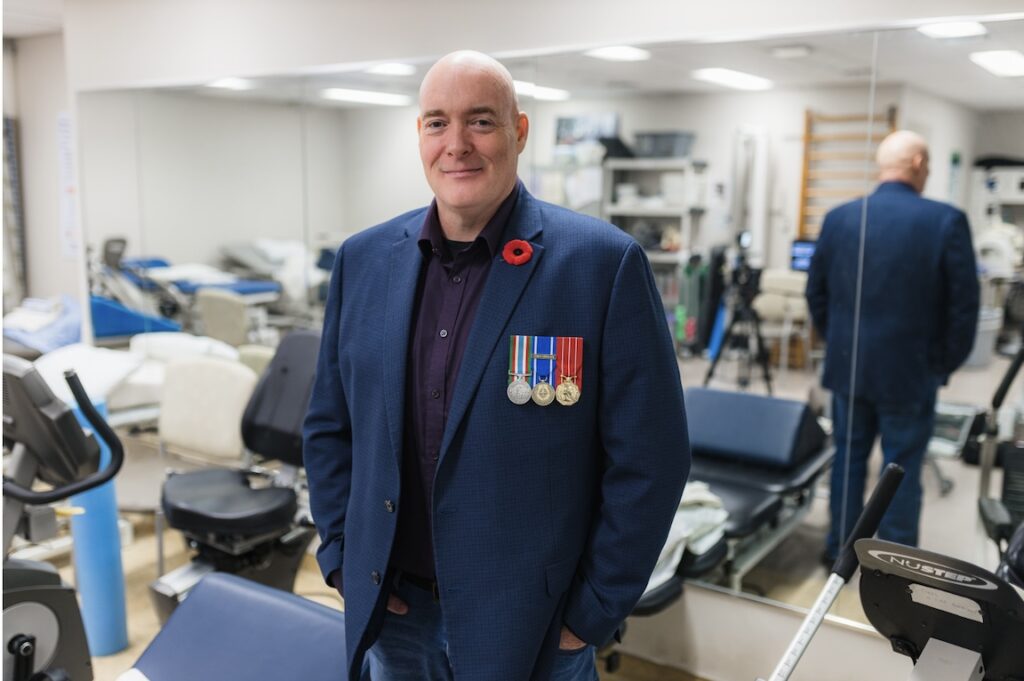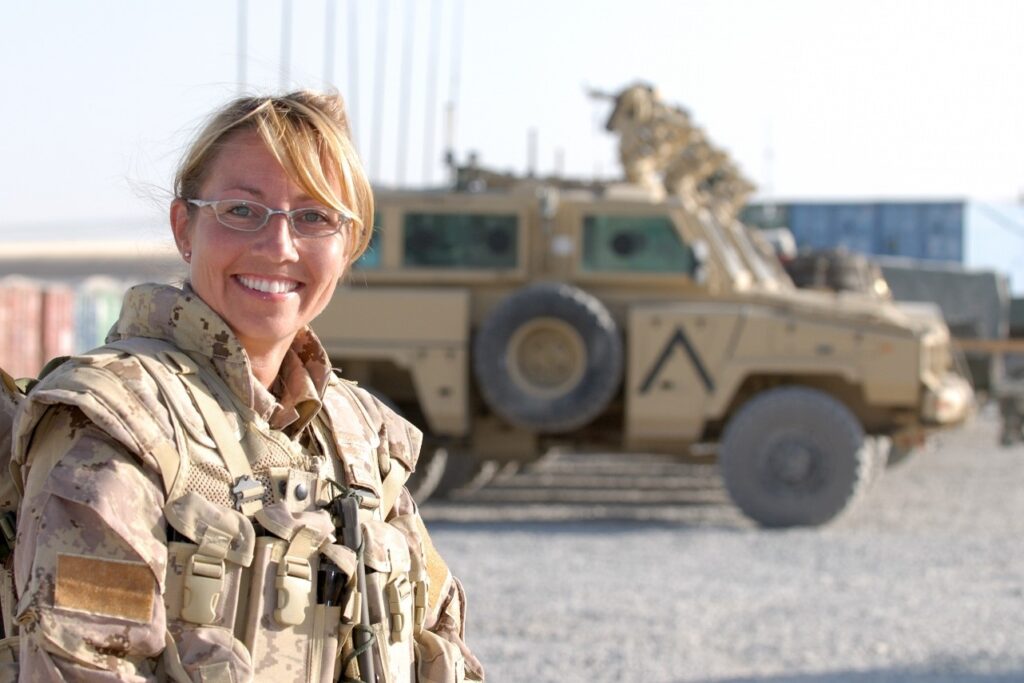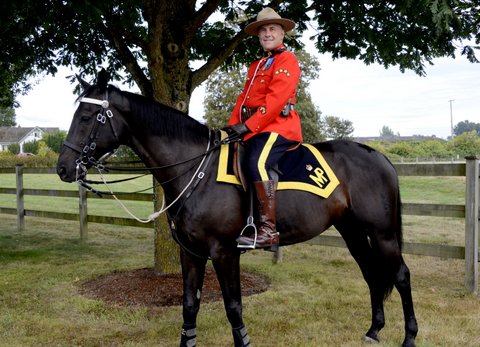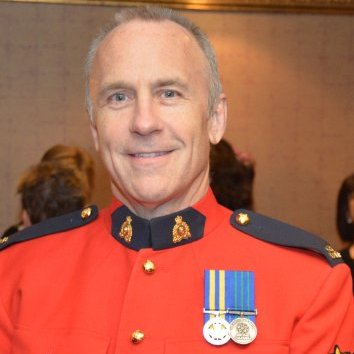Remembrance Day: Hamilton is nexus of research and treatment of pain in veterans

The city is home to the only research centre specializing in chronic pain of veterans in Canada and the largest clinic nationally treating retired soldiers experiencing the debilitating effects of long-term pain.
By Lise Diebel, Hamilton Health Sciences
Hundreds of Canadian veterans, including many treated for chronic pain at the Hamilton Health Sciences (HHS) Michael G. DeGroote Pain Clinic, continue to serve their country by taking part in leading-edge research funded by the Chronic Pain Centre of Excellence for Canadian Veterans (CPCoE), a national, independent, not-for-profit research centre based at McMaster Innovation Park in west-end Hamilton.
The CPCoE research centre was established by Veterans Affairs Canada with HHS and McMaster University as stakeholders. It is Canada’s only research centre specializing in veterans’ chronic pain and its mission is to improve the well-being of veterans and their families. Since opening in 2020, the CPCoE has funded more than 60 studies in Canada, the United States, the United Kingdom and Australia including at HHS and McMaster University.
In this feature, reprinted here with permission of Hamilton Health Sciences, we share more about the CPCoE and the pain clinic, and introduce three veterans involved in leading-edge research aimed at improving the quality of life for their retired comrades.
Retired soldiers serve their country through research
The week leading up to Remembrance Day on Nov. 11 is especially meaningful to retired soldiers John Brown and Helene Le Scelleur, and retired RCMP officer Cameron Kowalski. Not only is this Veterans’ Week, it’s also National Pain Awareness Week.
Brown, of Dorchester, Ont., and Kowalski, of Hamilton, are veterans who received treatment for chronic pain at Hamilton Health Sciences. While Brown is retired from the military and Kowalski from the RCMP, they continue to serve their country by supporting leading-edge research aimed at helping fellow veterans manage chronic pain. Le Scelleur, of Quebec, is also committed to research through her PhD in social services, which examines the identity crisis that follows the transition to civilian life for military personnel living with post-traumatic stress disorder and chronic pain.
Below, the three veterans are sharing their stories, including why they’re passionate about research into chronic pain management.
Soldiers of misfortune
While 20 per cent of Canada’s population is affected by chronic pain, this jumps to 40 per cent for male veterans and 50 per cent for female veterans. It’s not surprising given the nature of their work, says Dr. Ramesh Zacharias, chief executive officer at the Chronic Pain Centre of Excellence for Canadian Veterans (CPCoE).
Along with his work at CPCoE, Zacharias, a pain management specialist, also sees patients including veterans once a week at the HHS Michael G. DeGroote Pain Clinic, located at HHS McMaster University Medical Centre. It’s the largest academic, university-affiliated pain clinic in Canada and the largest pain clinic nationally for treating veterans with chronic pain. More than half the patients he cares for at the pain clinic are veterans.
Chronic pain is more common in veterans, largely due to wear and tear on their bodies over many years of training and service, says Zacharias. “They’re carrying heavy packs, jumping in and out of tanks, loading heavy cargo, and sometimes sleeping on dirt floors. That’s the job and they know what they signed up for but unfortunately it comes with the burden of chronic, long-term pain for many.”
Half of female veterans experience chronic pain, often due to ergonomics because military equipment has traditionally been designed for larger male bodies.
Mental health challenges such as post-traumatic stress disorder (PTSD) are also tied to chronic pain for both male and female veterans, says Zacharias. “Studies show that 60 per cent of veterans with chronic pain also have mental health concerns, and 63 per cent of people with mental health concerns have chronic pain. It’s two sides of the same coin. You can’t separate the two.”
Veteran found life-changing relief through HHS pain clinic
John Brown spent 20 years as a military police officer based in Ontario with tours in Bosnia and Germany. He retired from the military at age 44 after being diagnosed with post traumatic stress disorder (PTSD).
While Brown sought counselling for PTSD, he pushed aside chronic, debilitating knee and back pain from years of wear and tear in the military, even though it was affecting his ability to walk short distances, do household chores and parent his four children.
“In the military you have this mindset of pushing through the pain to get tasks done,” says Brown, who found himself exhausted and sore after simple activities like mowing the lawn. He was often in a bad mood due to pain, straining his relationship with his family. “I could barely get off the couch. I felt like failure as a father,” he recalls.
Fortunately, his PTSD counsellor recognized that his physical pain also needed addressing and referred him to the intensive five-week pain management program at the HHS Michael G. DeGroote Pain Clinic.

The third-party funded pain management program that Brown completed is available through Veterans Affairs, Workers’ Safety and Insurance Board, and insurance companies for motor vehicle accidents. It’s offered in a group format with a mix of veteran and civilian participants, and includes fitness and education classes, tai chi, yoga, and sessions on breathing, relaxation and mindfulness since mental health and pain management often go hand in hand.
There are also sessions on understanding pain management, such as the science of pain, the importance of pacing yourself in daily activities, self-talk, communication, sleep, grief and loss, and medication. Sessions help patients understand that while their pain is a chronic condition that won’t go away, it can be managed better so that they can have a better quality of life.
“Our pain clinic stands at the forefront of excellence, blending interdisciplinary expertise to deliver cutting-edge, patient-centered care while driving innovative research that transforms pain management practices,” says Dr. Eugene Maida, the pain clinic's medical director.
The team supporting program participants includes a physician/pain specialist, a psychologist, a psychometrist, a physiotherapist, pharmacists, social workers, dietitians and occupational therapists, all with expertise in chronic pain management.
Brown, who completed the five-week program in 2018, found coping strategies like pacing himself to be especially helpful. Since mowing the lawn in one stretch triggered pain, he learned to take breaks.
“The breathing and relaxation techniques I learned also helped out significantly in calming my mind and helping me sleep at night,” says Brown, who still uses these strategies if he has difficulty sleeping or clearing his mind. “I also learned how valuable yoga can be and still practise it to this day.”
Over time, he discovered other activities he could manage comfortably, like cycling. Since he started riding six years ago, he’s logged over 10,000 km.
Connecting to research opportunities
When the CPCoE opened at the McMaster Innovation Park in 2020, Brown was given opportunities to participate in research specifically for veterans with a focus on pain management. By then, he was using medical cannabis to manage pain, and he joined CPCoE-funded studies focusing on this.
The CPCoE was established by Veterans Affairs Canada with HHS and McMaster University as stakeholders. It is Canada’s only research centre specializing in veterans’ chronic pain. Its mission is to improve the well-being of veterans and their families. Since opening, the CPCoE has funded more than 60 studies in Canada, the United States, the United Kingdom and Australia including at HHS and McMaster University.
Brown says he struggled for months with the idea of trying medical cannabis. “During my career I put people in jail for using cannabis,” says Brown. “I didn’t want to try it, even though a doctor was recommending and prescribing it. I felt like a hypocrite after arresting people for using it.”
Then a veteran friend who had found relief using cannabis urged him to consider it. It worked wonders, says Brown, who continues to use a prescribed amount daily to manage pain.
“Having evidence-based research can help break down barriers so that other vets might consider medical cannabis as a viable pain management option,” Brown says. “Connecting with the pain clinic was life changing for me, and taking part in research that could help other veterans is my way of giving back.”
Ex-RCMP officer finds new career in research
Hamilton resident Cameron Kowalski is a retired RCMP officer who now works as the director of operations for the CPCoE. He completed the pain clinic’s intensive program in 2022, before joining the CPCoE’s staff.
Retired RCMP officers are recognized as veterans by Veterans Affairs Canada because they serve federally, as well as internationally as peacekeepers.
Kowalski found himself seeking help for pain after retiring from a 30-plus career with the RCMP. In the latter part of his career, he led air security for high-profile events like the 2010 Olympics and G8 and G20 summits. But the bulk of his policing years were spent as a uniformed officer in western Canada, answering calls and responding to emergencies. Uniformed officers, like soldiers, wear about 18 pounds of equipment including a bullet proof vest, a pistol, and handcuffs.
“Carrying around this extra weight for 12 hours a day, four days a week, for 25 years takes a toll on your body,” says Kowalski, who developed chronic pain in the knees, hips, lower back and neck. He also had difficulty sleeping, and experienced PTSD-related symptoms due to some of the horrific calls he responded to. “The job wears on you from a mental perspective. You see things that you can’t un-see.”
A Hamilton native, Kowalski moved back to the city after retiring and was seeing multiple doctors for his variety of health issues. Then his Veterans Affairs case worker recommended he try the pain clinic’s five-week intensive program. “The resources there were incredible,” says Kowalski, whose quality of life improved significantly by following strategies he learned, including pacing himself and managing pain with medical CBD products.
“Completing the pain program was the greatest experience I’ve had for treatment,” says Kowalski, who met Zacharias through the pain clinic.
When a position opened at the research centre for a director of operations, Zacharias encouraged Kowalski to apply. The opportunity to join the research centre as staff, supporting leading-edge pain management research for Canadian veterans and their families inspired him to come out of retirement.
“I joined the RCMP to serve,” says Kowalski, who was hired for the position. “It’s instinctive in my DNA. Supporting research through my work at the centre allows me to continue to serve by helping veterans.”
From the army to academics for retired soldier
Quebec resident Helene Le Scelleur holds leadership positions with the CPCoE as vice chair of the research centre's advisory council and member of its scientific advisory board.
Le Scelleur enlisted in the Canadian Armed Forces in 1990 at age 17. She joined the regular forces in 1999, serving 26 years primarily as a health-care administrator with deployments in Afghanistan and the former Yugoslavia.
Le Scelleur went on to become the aide-de-camp to the governor general of Canada, but her career came to an end in 2016 when she was medically released following a diagnosis of PTSD linked to her service in Afghanistan.
She went on to complete a master’s degree and is currently working on a PhD in social services at the University of Ottawa. Her thesis, partly funded by the CPCoE, examines the identity crisis that follows the transition to civilian life for military personnel living with PTSD and chronic pain.
“In the beginning, my research focused on mental health only, but the reality is that 63 per cent of participants in my research are also living with chronic pain, so I’ve included chronic pain in my thesis,” she says.
The veterans she interviewed for her thesis minimized their chronic pain. “They treated it like it wasn’t important. They considered it normal pain that came with the job,” she says, adding that this military mindset of normalizing chronic pain creates a barrier for seeking treatment.

Photo: Courtesy of Helene Le Scelleur
Pain patients contributing to research data
Patients in the pain management program at the HHS Michael G. DeGroote Pain Clinic fill out a detailed questionnaire at the beginning and end of the five-week program to assess any changes or improvements in pain level, perceived pain-related disability, overall functioning, and mood. Completed questionnaires are entered into a database and different ethically-approved research projects are undertaken to evaluate the program’s effectiveness.
So far, the growing database contains feedback from more than 150 participants, including veterans. Many of these veterans also volunteer to participate in research studies funded by the CPCoE.
Research findings are used to promote evidence-based best practices for veterans and the health-care professionals treating them, as well as researchers and case managers with Veterans Affairs Canada.
Veterans interested in participating in the five-week pain management program are encouraged to speak with their Veterans Affairs case manager. Veterans wanting more information on research opportunities can join CPCoE’s mailing list.
The following studies are currently underway and include HHS pain clinic patients, doctors and staff. All studies are supported by HHS and the CPCoE:
- Intensive Six-Month Follow-Up Study: (77 participants, veterans and civilians). Patients who completed the five-week pain management program are surveyed six months later to rate their pain and various pain-related outcomes, so this can be compared to their earlier feedback. This study is ongoing. The principal investigator is HHS psychologist Eleni Hapidou. The research coordinator is Jennifer Anthonypillai.
- Veterans Cannabis Therapy Outcome Registry: (VECTOR) study: (200 participants, veterans only). This study surveys veterans who use medical cannabis to better understand its usefulness in managing chronic pain, mental health issues and sleep. Principal investigators are HHS psychologist Dr. Greg Tippin and HHS clinical pharmacist Dr. Vikas Parihar.
- Cannabis Use Disorder Identification Test Review Study: (22 participants, veterans and civilians). This study is assessing problematic cannabis use such as overuse and dependence. Tippin is the principal investigator.
- Pelvic Pain Retrospective Study: (50 participants, veterans and civilians). This study involves reviewing medical histories of female pain clinic patients who have participated in the five-week program to compare incidence of pelvic floor dysfunctional symptoms and disorders. The principal investigator is physiotherapist Adria Fransson and co-investigators are Hapidou and Anthonypillai.
- Examples of interventional research include:
- Epidural steroid injections: (65 participants, veterans and civilians). This study looks at the effectiveness of corticosteroid injections in helping patients manage pain from spinal stenosis, when the space inside the backbone is too small, putting pressure on the spinal cord and nerves. The principal investigator is Dr. Vladimir Djuric, a pain clinic doctor.
- Peripheral Nerve Stimulation Study: (57 participants, veterans and civilians). This study is assessing the therapeutic effect of image-guided pulsed radiofrequency in treating nerve pain. The principal investigator is Dr. Akil Siva, an interventional pain specialist.
– Republished with permission of Hamilton Health Sciences.

















